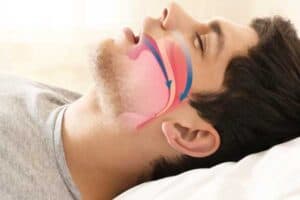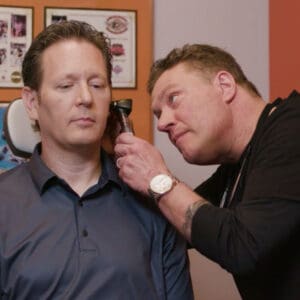Sleep Apnea and CPAP Devices
Obstructive sleep apnea is a common condition and as the name implies, affects the individual while they are sleeping. With this condition, the sleeper’s upper airway becomes partially or totally blocked. The result is person awakes from their slumber. There may also be a variety of other signs and symptoms. There are certain factors that can lead to a person developing obstructive sleep apnea, or OSA, including obesity. Left untreated, obstructive sleep apnea can cause a host of other problems that may impact a person’s quality of life.
How Obstructive Sleep Apnea is Diagnosed
 In order to properly diagnose obstructive sleep apnea, a person will need to undergo a professional sleep study which is typically conducted in a medical setting. This sleep study is also sometimes called an apnea-hypopnea index. The results will be set to a number scale. The higher the number is directly correlates to how severe the sleep apnea is. These studies assist health professionals in diagnosing the severity of the condition. Patients may also experience negative health symptoms because of their sleep apnea. This means that sleep apnea should be treated and cared for, regardless of the severity. However, a great majority of patients are considered to have mild sleep apnea.
In order to properly diagnose obstructive sleep apnea, a person will need to undergo a professional sleep study which is typically conducted in a medical setting. This sleep study is also sometimes called an apnea-hypopnea index. The results will be set to a number scale. The higher the number is directly correlates to how severe the sleep apnea is. These studies assist health professionals in diagnosing the severity of the condition. Patients may also experience negative health symptoms because of their sleep apnea. This means that sleep apnea should be treated and cared for, regardless of the severity. However, a great majority of patients are considered to have mild sleep apnea.
Correlation Between Scores and Symptoms
While sleep apnea studies help medical professionals determine the severity of the sleep apnea issue and can help determine which symptoms a patient is experiencing as a result, they may not always determine the severity of these symptoms. For instance, someone who is experiencing what is considered mild sleep apnea may actually be experiencing very severe symptoms. The same can apply to someone who is considered to have severe sleep apnea, but may only have mild symptoms. Comorbidity can also play a factor, as many sleep disorders exist together. For instance, those who are suffering from obstructive sleep apnea may also suffer from restless leg syndrome, insomnia, or even narcolepsy. This is why it is important that a patient who is experiencing sleep disturbances or daytime sleepiness receives a complete sleep analysis, in order to provide them with the best treatment options for their unique situation.
Treatment Depends on Severity
If your sleep apnea falls under the moderate or severe categories, the first recommendation is likely to be a CPAP machine or a continuous positive airway pressure machine. This machine helps individuals minimize their snoring, regulates their oxygen saturation levels, and helps to level out breathing while a person is sleeping. However, it is recommended that a person wears the machine regularly and consistently. (Although, many studies have been conducted that reveal that that is not the case with many individuals.)
Treatment for Mild Sleep Apnea
 Mild sleep apnea has long been glossed over when it comes to recommendations for treatment and studies for data. However, there have been several studies that suggest that treatment can help to improve a person’s quality of life. A general consensus has been reached that the use of a CPAP machine has been proven to be beneficial, especially when combined with regular sleep hygiene maintenance and improvement. However, this does not mean that every individual with mild sleep apnea will require the use of a CPAP machine. But, for those that do, they could possibly benefit from it greatly.
Mild sleep apnea has long been glossed over when it comes to recommendations for treatment and studies for data. However, there have been several studies that suggest that treatment can help to improve a person’s quality of life. A general consensus has been reached that the use of a CPAP machine has been proven to be beneficial, especially when combined with regular sleep hygiene maintenance and improvement. However, this does not mean that every individual with mild sleep apnea will require the use of a CPAP machine. But, for those that do, they could possibly benefit from it greatly.
At Sinus and Allergy Wellness Center, we provide the most effective CPAP machines. The machines we recommend automatically determine the lowest pressure needed for treatment during the night. It helps reduce the number of doctor visits you’ll need for things like changing therapy pressure, as the machine is able to automatically determine the correct pressure and adjusts with you as your therapy needs change. This means you won’t need a sleep study and the doctor to manually change the pressure every time you need an adjustment. Your machine can do it for you.
Expect Trial and Error When it Comes to Treatment
Treatment methods and recommendations may not always be given easily, especially if your obstructive sleep apnea is mild. Your doctor will evaluate the severity of your symptoms and lay out methods that they feel will best work with your unique situation, as well as uncover or take into account, any current health issues. Many doctors implement a step-by-step approach that allows a patient to discover which methods work best for their individual needs. This means you may stop and start different treatment plans as you go, working towards your ultimate goal of getting a better night’s sleep.
Suggestions for Mild Obstructive Sleep Apnea
 Regardless of the severity of your obstructive sleep apnea, there are some strategies that may help you better manage your symptoms. For instance, your sleeping position can greatly affect your symptoms. Sleeping on your back is not typically recommended and instead you should try sleeping on one of your sides. This helps to open your airways. Depending on your doctor’s suggestion, it may be helpful if you lose some weight. Even a small decrease in weight could help with your symptoms. If you have persistent allergies or nasal congestion, you will also want to speak with your doctor about how you can treat this issue at home. Treating this issue will allow you to open your airways for better sleep. Also, keeping track of when you sleep, as well as maintaining a regular sleep schedule can help you feel more rested.
Regardless of the severity of your obstructive sleep apnea, there are some strategies that may help you better manage your symptoms. For instance, your sleeping position can greatly affect your symptoms. Sleeping on your back is not typically recommended and instead you should try sleeping on one of your sides. This helps to open your airways. Depending on your doctor’s suggestion, it may be helpful if you lose some weight. Even a small decrease in weight could help with your symptoms. If you have persistent allergies or nasal congestion, you will also want to speak with your doctor about how you can treat this issue at home. Treating this issue will allow you to open your airways for better sleep. Also, keeping track of when you sleep, as well as maintaining a regular sleep schedule can help you feel more rested.
Health issues that you currently have may be further irritated by your obstructive sleep apnea. Medical treatments for these issues may be recommended by your ENT doctor. Treatment of these underlying issues can allow you to minimize the symptoms of your sleep apnea and get a more restful sleep. For these issues, you may need to receive an evaluation from an ear nose and throat specialist like Sinus Allergy & Wellness Center in Scottsdale, Arizona and Fountain Hills, Arizona.
Speak with Your Doctor About Your Options
Depending on your symptoms and the result of your evaluation, your primary doctor may refer you for a sleep study or send you to see a sleep specialist or ENT specialist. From there, you will be provided with an individualized treatment plan based on the findings. While treatment plans can vary depending on the individual, you will find that taking steps towards better sleep can have significant benefits on your quality of life.
Disclaimer:
The information provided in this article is for informational and educational purposes only and does not constitute medical advice. It is not intended to diagnose, treat, cure, or prevent any disease or medical condition. Always seek the guidance of your physician or other qualified healthcare provider with any questions you may have regarding a medical condition or treatment.
Results may vary: Treatment outcomes and health experiences may differ based on individual medical history, condition severity, and response to care.
Emergency Notice: If you are experiencing a medical emergency, call 911 or seek immediate medical attention.



